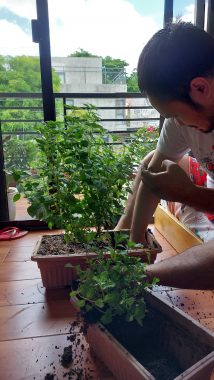My Husband Turns to Gardening to Improve His Mental Health
Written by |

My husband, Jared, and I have maintained a small garden on our balcony ever since we moved into our new home. We started out with just a few potted herbs, and as time went by, we expanded our collection to include some ornamental plants and flowers.
Jared is a wizard in the kitchen. He loves to prepare his own special recipes. In line with this, he enjoys collecting all sorts of herbs and spices. He’d wanted to start an edible garden so he could pick out fresh leaves from the comfort of home, instead of having to buy them from the grocery store.
Ideally, we’d love to reach a point where our garden fully meets our dietary needs. That way, he can gather ingredients on his own, even when he has an ongoing bleed due to hemophilia (unless he is completely immobile). Then, he could whip up his own comfort food. The joy of practicing a favorite hobby, along with its delicious products, can help distract him from the pain and boredom of nursing an unwanted injury.
For now, we’re starting with the basics. We already have two types of basil plants, which Jared has managed to propagate via cuttings. He uses them often to make pesto sauce, a staple in our home. We also have mint plants, which are fast-growing and therefore need to be trimmed often. The harvested leaves go straight into a pitcher of herb-infused water that we always keep in our refrigerator — a healthy drink for our desired healthy lifestyle.
Having an edible garden is most certainly practical. But beyond this, gardening as a hobby generally can improve a person’s mental health and well-being.

Labor of love: Jared doesn’t mind getting his hands dirty when tending to his plants. (Photo by Alliah Czarielle)
The very act of caring for plants has been therapeutic for Jared. His morning routine of watering them and giving them “haircuts” when necessary energizes him and reframes his mind in preparation for his daily responsibilities. I’ve noticed that he’s also in a much calmer mood when he gardens. He handles the plants very carefully, knowing that they are living things. He also gets sad when his cuttings fail to thrive. Interestingly, this puts him in touch with his emotional side. In effect, he’s more patient and less grumpy.
As a bonus for mental health, gardening can provide a sense of genuine fulfillment as one watches the plants grow taller, stouter, and bushier each passing day. Jared often tells me he is happiest whenever he achieves something through his own efforts. Hemophilia sometimes makes him feel less capable of things, hence his desire to prove to himself (and others) that he can do something — anything! Bonus points if he can do it well.
As our garden becomes richer and more lush, with beautiful flowers randomly sprouting out of leaf clusters, Jared’s sense of accomplishment grows, knowing that this is something he has nurtured. And as I sit in our tiny green space admiring this tiny patch of nature my husband (and occasionally I) so faithfully maintained, I think about his dedication to caring for the living things around him — including our daughter and me. And that thought also makes me feel happy and fulfilled.
Note: Hemophilia News Today is strictly a news and information website about the disease. It does not provide medical advice, diagnosis, or treatment. This content is not intended to be a substitute for professional medical advice, diagnosis, or treatment. Always seek the advice of your physician or another qualified health provider with any questions you may have regarding a medical condition. Never disregard professional medical advice or delay in seeking it because of something you have read on this website. The opinions expressed in this column are not those of Hemophilia News Today or its parent company, Bionews, and are intended to spark discussion about issues pertaining to hemophilia.




Leave a comment
Fill in the required fields to post. Your email address will not be published.